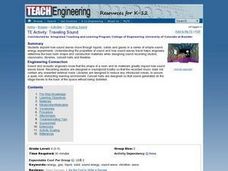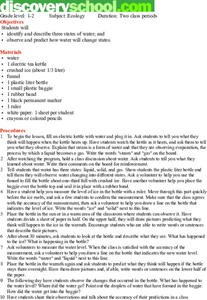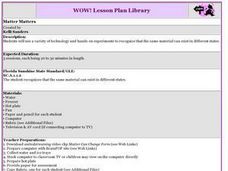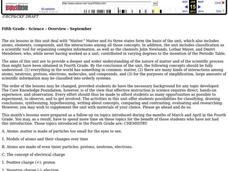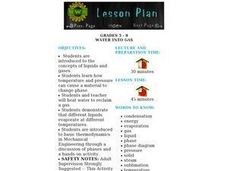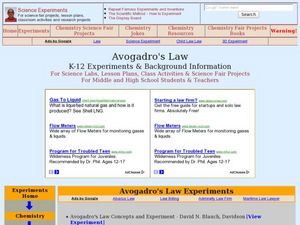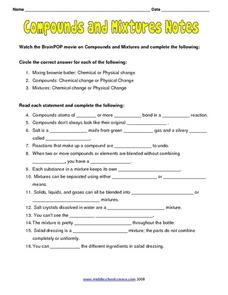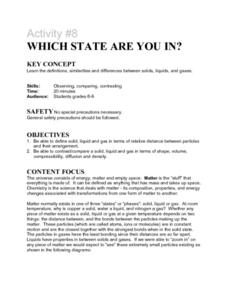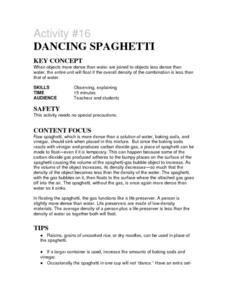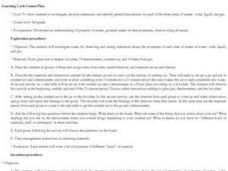Curated OER
Traveling Sound
Students explore how sound waves move through liquids, solids and gases in a series of simple sound energy experiments. They describe how sound needs molecules to move and that changing the medium that it travels through changes the...
Curated OER
Ecology
Pupils identify and describe three states of water. They predict how water will change states.
Curated OER
Matter Matters!
Second graders experiment with heating and cooling and research the states of matter (solid, liquid, gas).
Curated OER
State of Matter - Atoms
Students examine and discuss how atoms change from solid to liquid to gas. They inflate a balloon by melting ice that converts to steam, and discuss the results.
Curated OER
What Is the Matter with Water?
Second graders observe matter in all 3 states : liquid, solid and gas, in an ice cream soda. In teams, they are given ice and teams compete to be the first to melt their ice. Winner gets the ice cream soda. They draw examples of 3 states...
Curated OER
Cloud Watchers
Second graders read "The Cloud Book" by Tomie dePaola to jumpstart their cloud study. They offer examples of liquids, solids, and gases and chart them. They observe the making of a cloud in a demonstration. They discuss and draw...
Curated OER
Formation of Fossil Fuels
Students research the origin of oil and natural gas to gather an understanding of the stages of fossil fuel formation. Then the class creates murals depicting the life cycle of a fossil fuel.
Curated OER
Matter
Fifth graders investigate the nature of matter and of the scientific processes associated with them in this series of lessons.
Curated OER
Water Into Gas
Students investigate how temperature and pressure cause a material to change phase. They heat water to reclaim a gas. They demonstrate that different liquids evaporate at different temperatures.
Curated OER
Avogadro's Law
Students study Avogadro's law and what it means in science. In this gaseous lesson students complete an Avogadro's law experiment.
Curated OER
Phases of Matter
Young scholars describe the motion of solids, liquids and gases. In this chemistry lesson, students describe how temperature affect motion of the particles. They determine the physical properties of each phase.
Curated OER
What's the Matter?
Students investigate matter. In this matter lesson, students identify types of matter and characteristics of each type. Students discuss matter and create matter posters to show understanding.
Curated OER
Meter Reading Using Place Value
Fourth graders read gas meters to measure cubic feet and learn place values. For this place value lesson, 4th graders watch a video about meter reading and discuss place value on the gas meter dials. Students study a related chart and...
Curated OER
Gases
In this gases worksheet, students review the 3 states of matter, the types of molecular motion, and the characteristics of gases. This worksheet has 30 problems to solve.
Curated OER
Compounds and Mixtures Notes
In this matter worksheet, students watch a movie and then compare the differences between compounds and mixtures. This worksheet has 16 fill in the blank questions.
Curated OER
What Are Physical Changes in Matter?
In this matter worksheet, students write down 3 causes and effects of physical changes in matter. This worksheet is a graphic organizer.
Curated OER
What is a Physical Change in Matter?
In this matter worksheet, students complete a graphic organizer by writing in 1 thing that causes a physical change in matter and 3 effects this has on matter.
Curated OER
Boyle's Law
In this Boyle's Law instructional activity, students respond to several short answer questions that pertain to Boyle's Law. They determine the volume of gas when pressure is increased and/or decreased. Students also determine what the...
Curated OER
Charles' Law
In this Charles' Law worksheet, students respond to several short answer questions as they pertain to Charles' Law. they calculate the decrease in temperature when it is compressed a specific amount. Students also determine the volume...
Curated OER
Activity #8 Which State Are You In?
Middle schoolers define, give similarites and differences between solids, liquids, and gases. They compare and contrast a solid, liquid and gas in terms of shape, volume, compressibility, diffusion and density. Pupils classigy common...
Curated OER
Activity #9 A State Debate!
Students list individual properties of solids, liquids, and gases. They examine that some properties have more than one state of matter. Pupils consider whether shaving cream, is a solid, a liquid, or a gas, or some combination.
Curated OER
Activity #16 Dancing Spagehetti
Students experiment with floating the spaghetti, the gas functions like a life preserver. Pupils comprehend that a person is slightly more dense than water. They comprehend that a life preservers are made of low-density materials. The...
Curated OER
Individual Gas Laws
Students learn the relationships between the different properties of a gas and use previous knowledge and make predictions. They predit and explain certain phenomena of gases using their chemical knowledge.
Curated OER
Learning Cycle Lesson Plan
students investigate, develop inferences, and identify general descriptions for each of the three states of matter - solid, liquid, and gas. students investigate water, by observing and stating inferences about, the properties of each...


